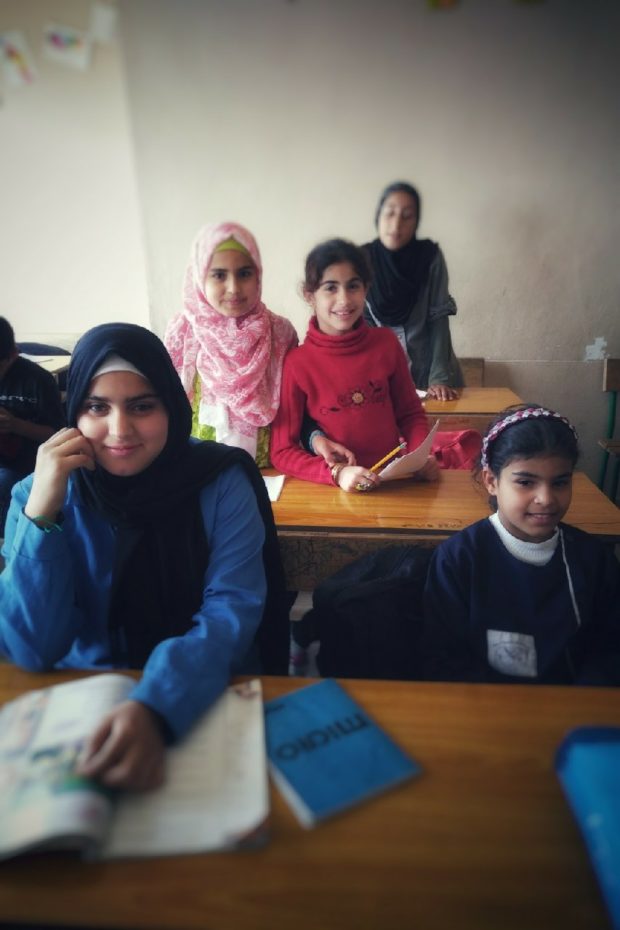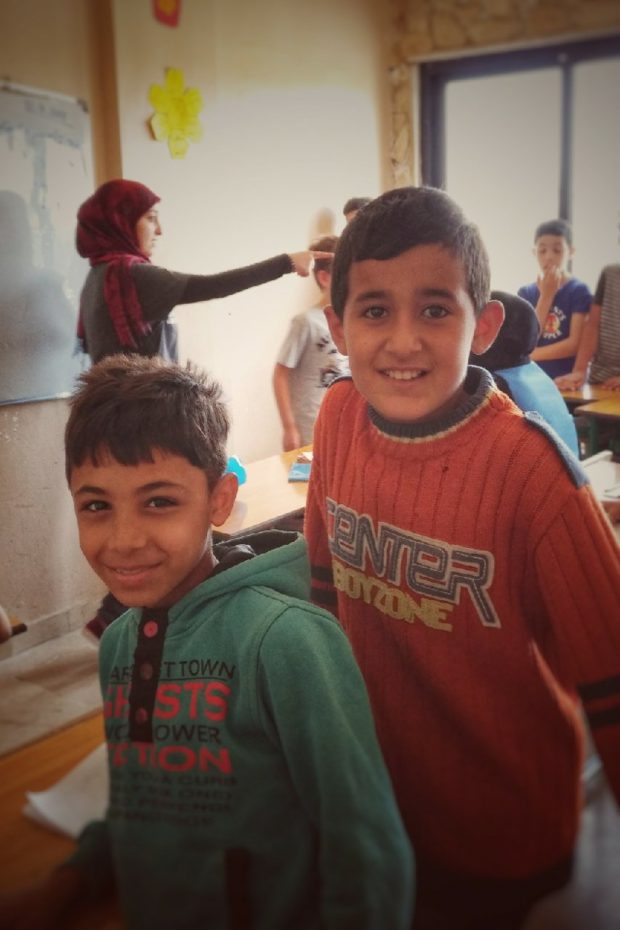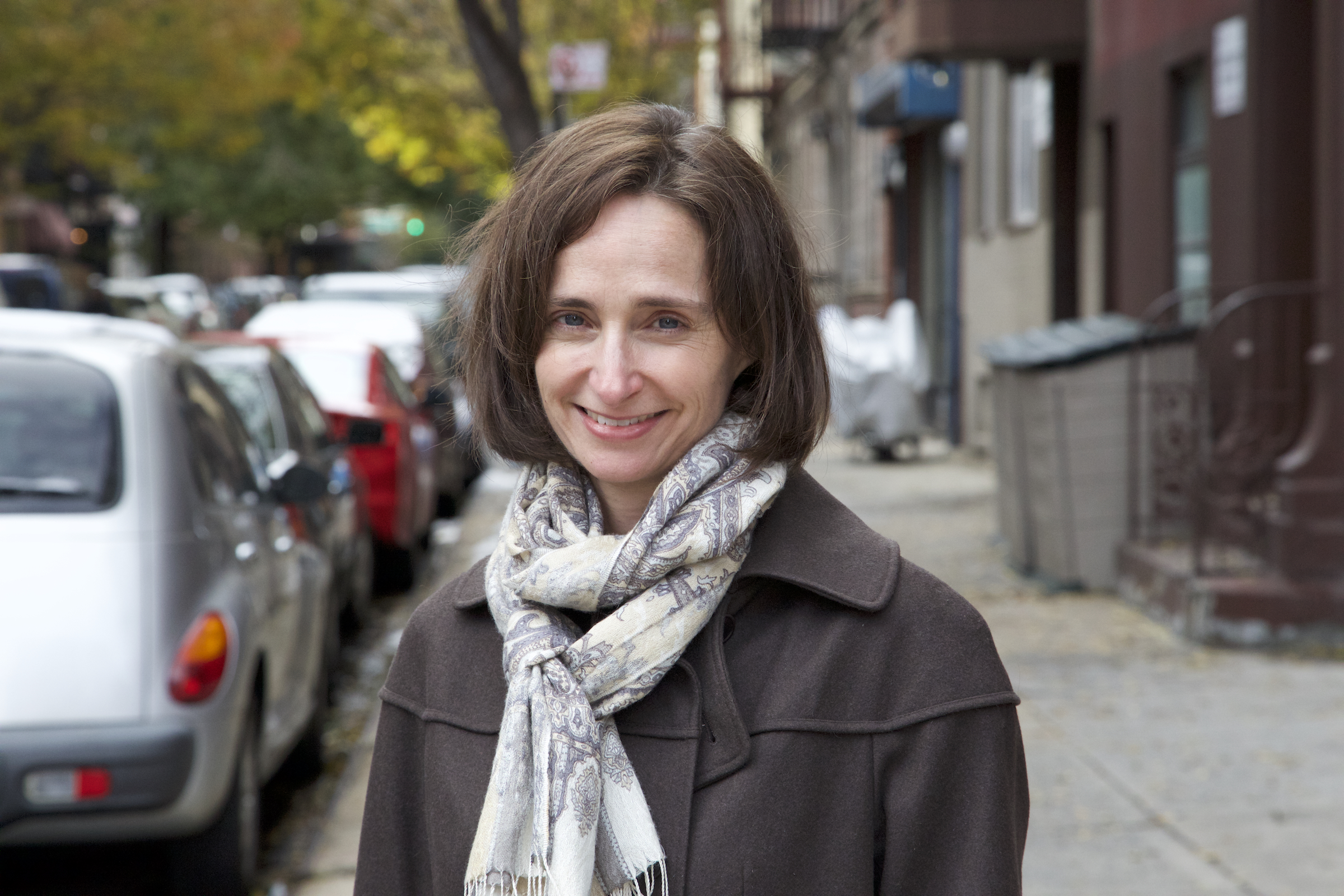All year long in the fourth- and fifth-grade classes of Daphnée Marchini-Block and Patrick Charles this year, students were engaged in a special partnership with a school in a camp for Syrian refugees in Lebanon. The project was the the catalyst of Amira and Dean Amro (parents of Zayd in Mr. Charles’s class), who introduced us to the school through the work of Swiss 4 Syria, an aid organization that supports refugees in Lebanon. It was a moving, important exchange for the children and adults in both schools, and certainly a humbling one for everyone involved at the Lycée.
The children in the Lebanese school had to flee many cities in Syria at the start of the war. They are from families of cities and towns we’ve all come to know from the news like Homs, Aleppo and Raqqa. Their parents were teachers, doctors, lawyers, nurses and academics in Syria, and war has simply uprooted them. They are among the record 68.5 million people around the world who are now forcibly displaced, according to the UNHCR. There is much work to do.

Making a Connection
In Patrick’s’ fourth-grade class, students participated in exchanges of many sorts throughout the school year. Each child was assigned a pen pal. They wrote letters, sent videos back and forth, told each other stories about themselves, and shared objects from their daily lives. The Syrian children taught our students words in Arabic, and Mr. Charles’s class taught the children words in French.
Our students learned that life circumstances are often happenstance. They learned what it means to be a refugee and caught a glimpse of what life might be like for young children living in a refugee camp. Despite the challenging circumstances of their daily lives, the children in the camp seemed always to be vibrant and joyful. What an extraordinary message of courage for children.
One of the highlights of the year in Patrick’s class was the creation of a special video with songs of peace created by our students to share with the children in the camp. They were able to use the Arabic their new friends had taught them in the song, which we’re delighted to share here.
As the school year came to a close, Patrick collected student reflections on the exchange. “I made a new friend,” said Maia. “J’aurais très envie que la guerre finisse et qu’ils retournent dans leur pays,” said Martin. “J’ai apprécié les objets que mon correspondant m’a donné, je les garde toujours dans mon bureau, said Enzo. “J’espère qu’un jour, je vais rencontrer mon correspondant,” said Sam. “It made me so sad to hear about the war but so happy to see them smile all the time,” said Jasmine.
“Ce projet d’échange est le plus beau et le plus sincère que j’aie fait avec une classe au cours de ma carrière qui compte près de 40 ans d’enseignement avec des enfants,” says Patrick. “This exchange was the most beautiful and sincere project I have done in my 40 years as a teacher to children.”
Seeking Deeper Understanding
Daphnée Marchini-Block, whose students are in one grade higher, built on the emotional connection her students were making on the ground in Lebanon to engage them more fully in an understanding of some hefty issues – hunger, displacement, history, and even geopolitics.
She set the tone for the year early. The project in her class started with a visit to the United Nations in October for the International Day for the Eradication of Extreme Poverty. They joined members of the UN General Assembly for a special summit of NGOs supporting families in need and heard personal stories of people from around the world who have had to fight against poverty all their lives.
An exchange similar to the one in Patrick’s class was developed, with videos shared and letter-writing between the students, and a special gift of books to the school organized with support from the Primary Library and parents in her class. Daphnée’s class also shared a movie they created about the Mood Meter, an essential Social and Emotional Learning tool in Primary, and shared materials on how to build a kindness wall like the one her own students had created. In exchange, the Syrian students sent the class their video about conflict resolution, a topic of deep importance to them.

Amira, who helped forge the relationship between our schools, visited Daphnée’s class along with the head of Swiss 4 Syria to talk about the legal status of the refugees. Our students learned about the challenge of being a refugee, and the years refugees often spend in camps waiting for a host country to welcome them. They also learned about the many reasons why such mass displacements can happen – from war to environmental concerns to disease – and the geopolitical impact of these mass displacements on countries and communities.
Daphnée’s work with the students culminated in the creation of an animated video about what they had learned. Many of you may know the character, Mr. Cupcake, who was created by Daphnée’s students two years ago with the support of Zhora Tsouri in the Primary Library. Mr. Cupcake is a student with a lot to learn, and he has become a fixture in her class and a highlight of the year for her students.
For this project, the class worked in teams for six weeks to develop a storyline, write scripts, record, draw and animate the project. Their objective was to teach Mr. Cupcake about the themes they had explored and learned in the exchange with the refugee students–from a very human understanding of the refugee experience to the experience of war historically and the reasons for the war in Syria.
Daphnée and the students screened the video for 21 parents in the class last Wednesday morning.
Thanks to everyone involved in this project, and most of all, to the Syrian students for opening up their lives to us.
About the Author :
Elisabeth King joined the Lycée team in November 2011 as the school’s first director of communications. A francophile at heart, Elisabeth spent her junior year of college in Paris, and held her first job at the French Trade Office here in New York. She brings to the Lycée over 15 years of experience in media and communications in non-profits, government, news and business. She was previously executive vice president and director of strategy at ABI, Inc., a boutique public relations agency, and she worked as associate editor on two books co-authored by Todd Brewster and the late ABC News anchor Peter Jennings.


